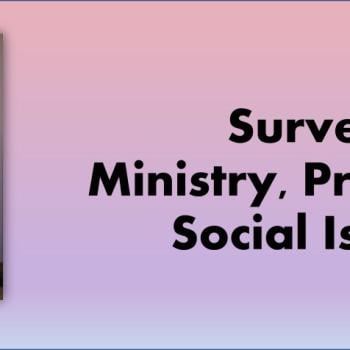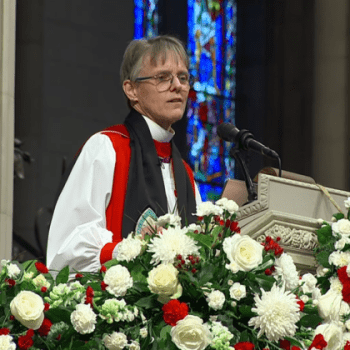An Eco-Pentecost celebrates churches united in their efforts to help restore and protect God’s Creation.
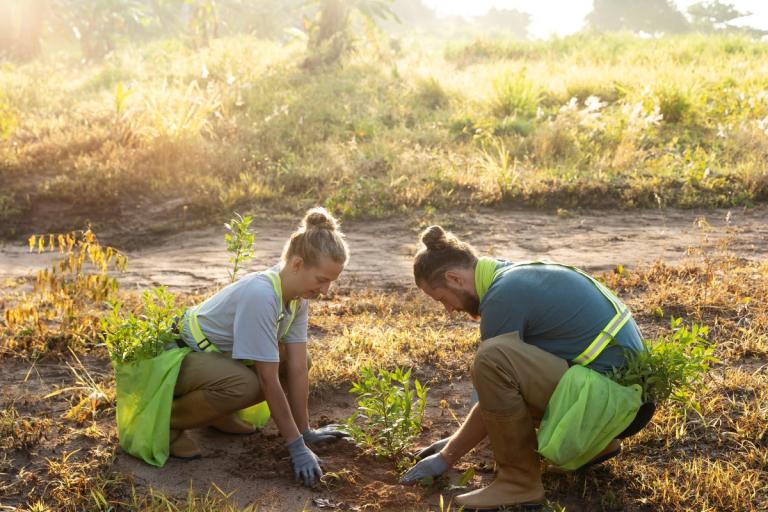
Here are ideas for reading and preaching Acts 2:1-21 and Romans 8:22-27 for Pentecost Sunday. These texts are assigned as part of the Revised Common Lectionary. This is part of the EcoPreacher 1-2-3 series to equip preachers and congregations for engaging the Bible through an ecological lens.
Eco-Exegesis
Eco-exegesis is a method of interpreting the biblical text through a green lens using the principles of ecological theology. Learn more here.
Acts 2:19a
“I will show portents in the heaven above and signs on the earth below.”
Peter’s speech to the crowd on the day of Pentecost quotes the Hebrew prophet Joel, interpreting the apocalyptic prophecy in light of the outpouring of the Holy Spirit on the disciples.
Joel 2:28-32 has apocalyptic imagery of a darkened sun and the moon appearing as blood. The “portents” also include “blood and fire and columns of smoke” (v. 30).
These strange phenomena are traditionally associated with what was known as the coming of the “day of the Lord” (2:30-31). It was a time of tribulation and the revealing of those who would “call upon the name of the Lord” – the faithful believers.
For Peter, an important part of the prophecy was the pouring out of God’s divine Spirit on the people.
This Spirit would enable them to dream powerful dreams and see important visions. The fact that a holy fire appeared over the disciples and enabled them to speak to foreigners in their native languages was a sign to Peter that the Day of the Lord had come.
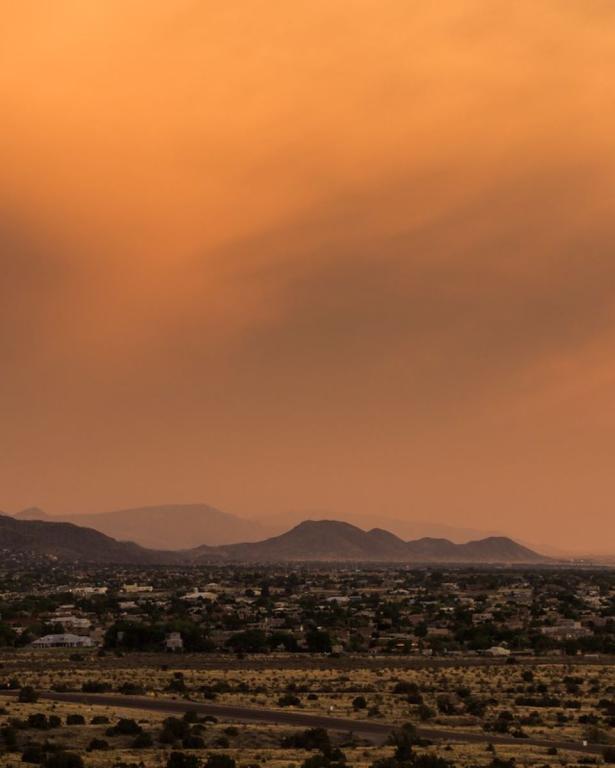
Portents of the climate crisis
From 1990-2020, hotter, dryer weather in some parts of North America caused the frequency of massive wildfires to grow steadily. With the 2023 Canadian fires, we saw eerie pictures of the sky shrouded in orange haze as columns of smoke compromised air quality across the U.S. and reached as far as Norway. But these were not portents of “the day of the Lord.” They were portents of the climate crisis.
Fortunately, many religious leaders are urging the faithful to unite in speaking the language of Creation-care.
For example, at the 2023 World Climate Conference in Dubai, the first-ever Faith Pavilion gathered a diverse, multifaith coalition of global partners from more than 50 faith organizations. Their goal was to catalyze change and inspire cooperation for shaping the moral values and ethical conduct around climate and environmental policy.
Your sermon could tell this story of the COP28 Faith Pavilion as an example of an Eco-Pentecost moment focused on advocating for justice and protecting Earth’s most vulnerable ecosystems and communities.
Romans 8:22-23
We know that the whole creation has been groaning in labor pains until now; and not only the creation, but we ourselves, who have the first fruits of the Spirit, groan inwardly while we wait for adoption, the redemption of our bodies.
Continuing our theme of an Eco-Pentecost, we turn to Paul’s Letter to the Romans. In the eighth chapter, he talks about the suffering of Creation together with humanity. Paul assures the church in Rome that amidst the persecution of their cruel, extractive empire, something new is being birthed.
Yet the travail is so intense, it’s difficult to see past the pain to what is possible. So, he encourages believers to see themselves as bearing the “first fruits of the Spirit,” even while they suffer as they await the fulfillment of God’s redemption.
First fruits of an Eco-Pentecost
How can the church bear the “first fruits” of an Eco-Pentecost amidst so much groaning from environmental and climate disasters? Surprisingly, we can find “first fruits” right in the belly of the beast of coal production – the state of Kentucky. The Roman Catholic Diocese of Lexington, Kentucky, has “pledged to reach net-zero emissions across its 59 parishes as well as schools and other institutions in the next six years,” according to an article by Brian Roewe for National Catholic Review.
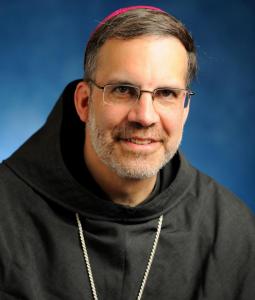
Lexington, Ky. Catholic Diocese pledges net zero carbon emissions
On April 22, Earth Day 2024, Bishop John Stowe announced the ambitious goal of eliminating carbon emissions across the diocese. “We’re grateful to say we’re going to do this and reduce our carbon consumption, our carbon footprint, and bring ourselves to net zero in a pretty short amount of time, because we only have a pretty short amount of time to make an impact in a lasting way on this world,” Stowe said.
The fact that this comes from a religious leader in a state with one of the largest coal deposits in the U.S. could be seen as evidence that an Eco-Pentecost is arising. We could say that Bishop Stowe, along with other faith leaders fighting for the climate, are among the “first fruits” of this Spirit-led movement to restore our planet and protect vulnerable communities.
Preachers can draw on the words of Rabbi David Rosen, international president of Religions for Peace, to inspire their own congregations. He said, as quoted in The Guardian, “As leaders and representatives of world religions, our role gives us a platform and a position to encourage, influence and motivate people, and thereby a responsibility to help guide our communities in how to restore, protect, and live in harmony with the natural world.”
This is a powerful dream and important vision for people of faith and for our planet.
1 Eco-Idea
The Eco-Idea is one succinct statement that tells us who God is and/or what God does in relation to Creation and how we should respond as people of faith.
God is uniting and rebirthing the church in an Eco-Pentecost movement for the healing of Creation.
2 Eco-Questions
Eco-Questions are what we can ask to help a congregation draw out the implications of the Eco-Exegesis and Eco-Idea.
- What is a local or national environmental issue that is a concern to the houses of worship in your area? In what ways can your congregation network with other faith leaders to advocate for just and equitable climate and environmental policies?
- What pledges has your church, judicatory, or denomination made to eliminate carbon emissions from its energy use? How can your congregation be part of the “first fruits” of the Eco-Pentecost?
3 Eco-Actions
Eco-Actions are ways that a congregation might respond to the Eco-Idea and Eco-Questions. One of these possibilities may have salience for your ministry context.
- If your congregation does not yet have a Creation care team, it’s time to start one! Many denominations have guides for how to create an Earth care ministry, including the Christian Church – Disciples of Christ, Episcopal Church, the Lutheran Church (ELCA), the United Methodist Church, and the Presbyterian Church (USA). It’s time to initiate your own Eco-Pentecost!
- Talk with local naturalists, master gardeners, fishermen, hunters, farmers, beekeepers, or others whose work involves the natural elements. Ask what changes they have observed in animal, plant, insect, fish, or other biotic communities in the last few decades. Invite them to speak at a forum at your church. Ask how your church can advocate for them in their vocations and professions.
- Join the One Home, One Future campaign to receive free access to support, community, resources, action guides, training, events, and more to help you and your congregation in preparing for disaster, strengthening your community, and protecting your loved ones. También disponible: recursos en español para apoyar a las comunidades de fé en cuidando de la creación.
Looking for ongoing support, resources, and colleagues as you preach about environmental issues?
The new EcoPreacher Cohort begins in September 2024! This is a monthly online gathering of preachers for learning and companionship to preach effectively in a climate-changed world. This is a Lilly Foundation-funded joint project of The BTS Center, Creation Justice Ministries, and Lexington Theological Seminary. To learn more click here.
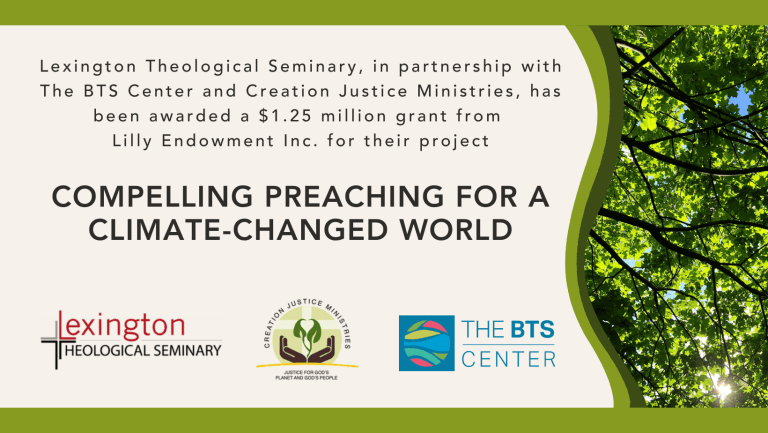
Read also:
Pentecost & the Divine Purpose of Diversity: Genesis 11, Acts 2
Pentecost is Political – Thanks be to God!
La Lengua de Dios: Pentecost and the Language of God
EcoPreacher 1-2-3 is a partnership between the Rev. Dr. Leah Schade and the Interfaith Center for Sustainable Development, publishers of Eco Bible, a Jewish ecological commentary on the Hebrew Scriptures. EcoPreacher 1-2-3 provides Creation-centered sermon preparation that is short, accessible, and based on a solid biblical foundation. To see other EcoPreacher ideas and to sign up to receive future EcoPreacher 1-2-3 installments, click here.
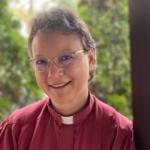
The Rev. Dr. Leah D. Schade is the Associate Professor of Preaching and Worship at Lexington Theological Seminary in Kentucky and ordained in the ELCA. Dr. Schade does not speak for LTS or the ELCA; her opinions are her own. She is the author of Preaching in the Purple Zone: Ministry in the Red-Blue Divide (Rowman & Littlefield, 2019) and Creation-Crisis Preaching: Ecology, Theology, and the Pulpit (Chalice Press, 2015). She is the co-editor of Rooted and Rising: Voices of Courage in a Time of Climate Crisis (Rowman & Littlefield, 2019). Her newest book is Introduction to Preaching: Scripture, Theology, and Sermon Preparation, co-authored with Jerry L. Sumney and Emily Askew (Rowman & Littlefield, 2023).





